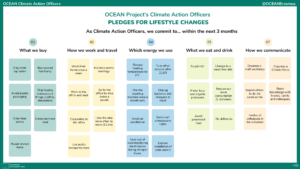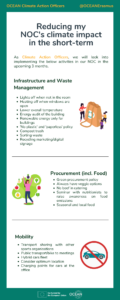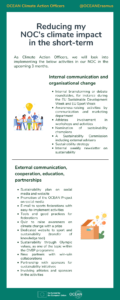On 12 December, the 3rd Online Seminar focusing on Carbon Footprint measurement occurred, led by OCEAN's scientific partner, Öko-Institut. The primary goal was to unveil the initial findings of the carbon footprint measurement, fostering a platform for Climate Action Officers to engage in discussions and share experiences related to gathering essential data within their NOC. Partner NOCs are in the final stages of data collection, while Öko-Institut is completing the reception process, poised to integrate the data for the comprehensive finalization of the measurement tool by the NOCs.
Following an overview of the data collection status provided by the Öko-Institut, partner NOCs were given the chance to exchange insights on their respective experiences with the data collection process. The consortium addressed key queries, including: 1) Assessing the level of effort involved in data collection; 2) Identifying aspects that were relatively straightforward during the process; 3) Highlighting challenges encountered in data collection; and 4) Proposing potential enhancements for the measurement tool.
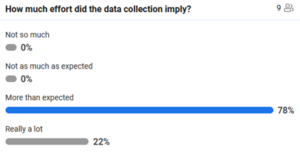
Climate Action Officers stated to have provided more effort than expected on the data collection process due to the proportion and variety of data to collect. The consortium encountered obstacles regarding the calculation of the data, for which the use of online platforms was identified as a potential solution, especially regarding indicators for commuting. More importantly, Climate Action Officers were recommended to use estimates of travels and roughly compile reported numbers, rather than seeking the exact detailed data. To improve the measurement tool, partner NOCs will use a collaborative document for options for improvements regarding the data collection. The consortium was overall confident about future measurements (i.e. for 2024) as they are now equipped with adequate processes and tools to collect the necessary data within their NOC.
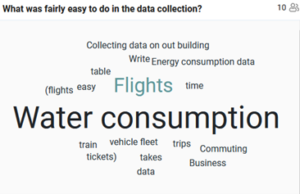
During the concluding part of the meeting, the Öko-Institut delivered an overview of the initial findings from the carbon footprint measurement, encompassing an overview of relevant terms within the context of carbon footprint assessment, along with a discussion on methodological choices and their implications. The conclusive results of this measurement are slated for presentation in March 2024, during Module 3 of the Training Course in Lausanne.
The final words of the meeting were dedicated to set the next steps of the project. The OCEAN consortium will convene virtually in January 2024, anticipating the forthcoming in-person meeting scheduled for March 2024 to kick off Module 3 of the Training Course for Climate Action Officers.

Following the first Module that took place in February in Brussels,, the 18 Climate Action Officers attended the second Module of the ‘Climate Action in Sport’ Training Course of the OCEAN Project online, which focused on their role and empowerment within their respective organisations.
During the first session, the Climate Action Officers received feedback and advice from experienced sustainability officers in charge of the green transition of their sports organisations.
Among them:
🔹 Bianca Quardokus, Sport Facilities, Environment and Sustainability Officer at the German Olympic Sports Confederation (DOSB);
🔹 Trine Keinicke Sørensen and Lasse Lyck from the NOC and Sports Confederation of Denmark (DIF);
🔹 Marleen Wielemaker, Programme Manager Sustainability at the Dutch Olympic Committee*Dutch Sports Federation (NOC*NSF);
🔹 Warwick Waters, Head of Advocacy and Stakeholders Engagement at the Australian Olympic Committee (AOC);
🔹 Riikka Rakic, Head of Sustainability at the International Biathlon Union (IBU);
🔹 Jamie McKeown, Sustainability, Diversity & Inclusion Manager at World Rugby.
In a panel discussion, the speakers first presented their academic and professional backgrounds and then addressed various topics relevant to the successful completion of their missions as Climate Action Officers, such as: staff and board engagement, dedicated budget for sustainability/climate, internal and external communication, and tips for accurate carbon footprint measurement.
Based on this feedback and their personal experience, the participants were able to draw up a detailed description of the role of the Climate Action Officers in working groups (see here). To conclude, participants had the opportunity to share the first actions they implemented within their NOCs since the end of Module 1 of the OCEAN project, based on the pledges made while in Brussels (see here).
The second session was led by Matthew Campelli, Sustainability Director of Touchline and seasoned consultant on sustainability for sport organisations. In a session on the do’s and don’ts of strategic communication on sustainability, Climate Actions Officers discussed in groups the right approach to internal and external stakeholders of the NOCs, whose engagement in climate action is necessary for a credible carbon footprint reduction strategy. Participants were also asked to draft a concrete communication plan for their NOC in the framework of the OCEAN project.
The third and last session was dedicated to staff engagement and empowerment activities, with general tips as to how to build and carry messages to convince internal stakeholders to engage in climate action. This was followed by an experience-sharing on concrete activities that can be implemented within the organisation.
🔹 Lise Van Long, Sustainability Manager at the International Olympic Committee (IOC) gave an overview of the IOC Sustainability Strategy implemented since 2017, and then presented some concrete activities put in place to engage IOC staff and board members (e.g. Green Week, carbon budget for travelling).
Partner NOCs (especially NOC Denmark, NOC Bosnia and Herzegovina, NOC Romania and NOC Slovakia) then presented the in-house trainings and presentations already done with their staff and directors since the beginning of the project.
Module 3 of the Training Course for Climate Action Officers will take place at the IOC and ANOC Headquarters in Lausanne in Spring 2024. Until then, the carbon footprint measurement process will start with the data collection and Seminars provided by the Öko-Institut to support Climate Action Officers.
The OCEAN Management Team congratulates all 18 Climate Action Officers for their commitment to making our sport more sustainable!
Following the Kick-off meeting, the 18 Climate Action Officers attended their first session of the ‘Climate Action in Sport’ Training Course of the OCEAN Project in Brussels.
For two days, the Climate Action Officers participated in interactive workshops on climate change and sport, and heard presentations from speakers engaged in the green transition of sport.
🔹 Tobias Wagner, Researcher at the Öko-Institut, introduced the German National Olympic Committee’s carbon footprint measurement process and offered an introductive course to climate change.
🔹 Isabelle Jean, Director of the Mobilisation Unit at WWF France, presented the study "Climate change: The world of sports at +2°C and +4°C" and showed how sports practices and infrastructure are and will be impacted by climate change.
🔹 Julie Duffus, Sustainability Senior Manager at the International Olympic Committee (IOC), presented IOC’s climate reduction plan as well as the United Nations Sports for Climate Action Framework as a practical way for National Olympic Committees (NOC) to engage more towards sustainability. She also focused on the importance of NOCs leadership’s commitment and the necessity to determine the scope of actions as the two main first steps of any strategic approach to sustainability.
🔹 Fabrizio D'Angelo, Sustainability Manager at the IOC, presented the IOC’s carbon footprint and provided some guidance on NOCs carbon footprint measurement, based on the GHG Protocol Standard and the3 scopes system.
As part of the interactive workshops, Climate Action Officers took part in the “Climate Fresk”, a participative game facilitated by the EOC EU Office, and worked together in groups on concrete actions that they could implement as individuals, as well as NOCs. The following questions were tackled: what needs to be done, and can how NOCs proceed?
These collaborative sessions led to very promising pledges and ideas of action at both individual and organisational levels. To know more, please see the figures below.
The Training Course will be organised in 5 modules between now and the end of the carbon footprint measurement process in December 2024.
Module 2 of the Training Course for Climate Action Officers will take place online from the 18th to the 21st of April 2023.
The OCEAN Management Team congratulates all 18 Climate Action Officers for their commitment to making our sport more sustainable!
